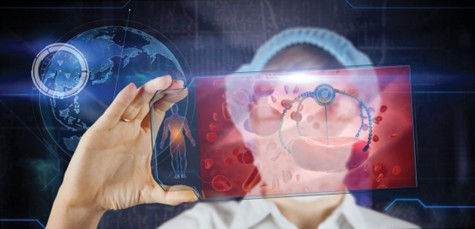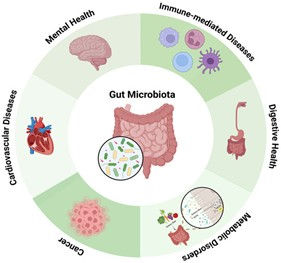Hacking the Human Microbiome: Cybersecurity Risks in Personalized Medicine
- Swarnali Ghosh

- Jun 4, 2025
- 7 min read
SWARNALI GHOSH | DATE: JUNE 03, 2025
Introduction: The Next Frontier of Cyber Threats

Imagine a future where doctors can customize your treatment based on the unique composition of your gut bacteria, optimizing drug efficacy and minimizing side effects. This is the promise of microbiome-based personalized medicine—a rapidly advancing field fueled by breakthroughs in genomics, AI, and biotechnology. But with great innovation comes great risk. As scientists unlock the secrets of the human microbiome, cybercriminals and malicious actors are finding new ways to exploit this biological data, turning our own microbes into potential weapons or targets for cyberattacks. The intersection of cybersecurity and microbiome science—dubbed "cyberbiosecurity"—has emerged as a critical concern in medicine. From stolen genetic data to manipulated microbial therapies, the vulnerabilities are vast and growing. This article explores the cutting-edge risks, real-world threats, and urgent safeguards needed to protect the future of precision medicine. In the era of personalized medicine, where treatments are tailored to an individual's genetic makeup and microbiome composition, the integration of microbiome data into healthcare has revolutionized our understanding of health and disease. However, this advancement brings forth significant cybersecurity concerns. As the significance of microbiome data continues to grow, so does its appeal to cybercriminals seeking to exploit sensitive biological information. This article delves into the cybersecurity risks associated with personalized medicine and the human microbiome, exploring the implications for individuals and the healthcare industry.
The Human Microbiome: A Digital Frontier
The human microbiome, comprising trillions of microorganisms residing in and on our bodies, plays a crucial role in health and disease. Advancements in sequencing technologies have enabled the collection and analysis of microbiome data, facilitating personalized medical interventions. However, the digitization of this sensitive biological information introduces new vulnerabilities. Microbiome data is inherently personal and unique to each individual. Studies have shown that microbial communities can be used to identify individuals with high accuracy. For instance, research indicates that individuals can be identified with 80% accuracy based on their stool microbiome samples. This uniqueness raises concerns about privacy and the potential misuse of microbiome data. The distinct nature of each individual’s microbiome brings up serious concerns regarding privacy and the risk of improper use of this information.
The Microbiome Revolution in Medicine
The human microbiome, which consists of trillions of microorganisms such as bacteria, viruses, and fungi that inhabit our bodies, is essential to maintaining health. Scientific studies have connected disruptions in this microbial community, known as dysbiosis, to various health issues, including obesity, diabetes, inflammatory bowel disease, and certain mental health conditions.
How Microbiome Data Powers Personalized Medicine
Diagnostics: Microbial signatures can predict disease risk, progression, and treatment response. For example, low levels of Faecalibacterium prausnitzii are linked to Crohn’s disease recurrence.

Therapeutics: Faecal microbiota transplants (FMT), probiotics, and genetically engineered microbes are being tested for conditions like C. difficile infections and cancer immunotherapy.
Drug Metabolism: Gut bacteria influence how drugs are broken down, allowing for tailored dosing based on an individual’s microbiome profile.
But here’s the problem: The same sequencing technologies that decode our microbiome also generate massive amounts of sensitive biological data—data that hackers are eager to steal or manipulate.
Cyberbiosecurity: Where Biology Meets Hacking
The digitization of biology has opened Pandora’s box of cyber threats. Cyberbiosecurity—a term gaining traction in defence and healthcare—refers to the risks arising from the convergence of biotechnology and cybersecurity.
Cybersecurity Risks in Personalized Medicine
Data Re-Identification and Privacy Breaches: Even when microbiome data is anonymized, it can be re-identified by cross-referencing with other datasets. This process, known as data re-identification, poses significant privacy risks. For example, combining microbiome data with publicly available information can lead to the identification of individuals, compromising their privacy.
Data Theft and Genetic Espionage:
Stolen Microbiome Data: Hackers can sell microbiome profiles on the dark web, where medical records fetch up to $1,000 per record, far more than credit card data.
Nation-State Attacks: During COVID-19, Russian and Chinese hackers targeted pharmaceutical firms and research labs working on vaccines, raising fears of biowarfare espionage.
Unauthorized Access and Data Theft: The storage and transmission of microbiome data in digital formats make it susceptible to unauthorized access and data breaches. Cybercriminals may target healthcare databases to steal sensitive microbiome information, which can then be sold on the dark web or used for malicious purposes. The value of such data increases when combined with other personal information, creating comprehensive profiles that can be exploited.

Manipulation of Microbial Therapies:
DNA Malware: Researchers have successfully embedded malware into synthetic DNA, which could corrupt gene-sequencing software and alter medical treatments.
Bioengineered Pathogens: If hackers access microbial databases, they could engineer drug-resistant superbugs or sabotage probiotic treatments.
Potential for Discrimination and Stigmatization: The misuse of microbiome data can lead to discrimination and stigmatization. For instance, insurance companies might use microbiome profiles to assess an individual's risk for certain diseases, potentially leading to higher premiums or denial of coverage. Similarly, employers could discriminate against individuals based on perceived health risks inferred from their microbiome data.
Ransomware Attacks on Biobanks & Labs: In 2021, a cyberattack on Miltenyi Biotec disrupted COVID-19 sequencing efforts for two weeks. Cold Storage Sabotage: Hackers targeted Americold, a vaccine storage provider, risking the spoilage of temperature-sensitive therapies.
AI-Powered Biohacking: Cybercriminals now use AI tools to accelerate attacks, breaching healthcare systems in under 27 minutes. AI could be used to reverse-engineer microbiome data, predicting vulnerabilities in personalized treatments.
Ethical and Legal Implications: The ethical and legal frameworks governing the use of microbiome data are still evolving. Current regulations, such as the Genetic Information Non-discrimination Act (GINA) and the Health Insurance Portability and Accountability Act (HIPAA), may not adequately protect individuals from the misuse of microbiome data. There is a pressing need to update these regulations to address the unique challenges posed by microbiome information.
Real-World Implications: The uBiome Case
The case of uBiome, a biotechnology company that offered microbiome testing services, highlights the potential risks associated with microbiome data. uBiome faced legal challenges and was eventually shut down due to fraudulent billing practices. The incident raised concerns about the handling of sensitive microbiome data and the need for stringent cybersecurity measures in companies dealing with such information.

Real-World Cases: When Biotech Meets Cybercrime
Case 1: The DNA Buffer Overflow Attack: In 2017, scientists revealed that it was possible to embed malicious code within synthetic DNA, which could then compromise the security of computers processing genetic information. The attack exploited a "buffer overflow" flaw, where excess code in DNA sequencing was misinterpreted as executable commands. If hackers inject malicious code into microbiome sequencing pipelines, they could corrupt diagnostic results or even alter prescribed treatments.
Case 2: Ransomware in Precision Medicine: In 2020, the NotPetya malware (linked to Russia) crippled Merck’s vaccine production, causing global shortages of Hepatitis B and HPV vaccines. A similar attack on microbiome-based drug manufacturers could disrupt life-saving therapies.
Case 3: Insulin Pump Hacks: While not microbiome-specific, the recall of 500,000 pacemakers in 2018 over hacking fears shows how implantable medical devices are vulnerable. Future microbiome-based implants (e.g., gut sensors) could face similar risks.
Mitigating Cybersecurity Risks
To address the cybersecurity risks associated with microbiome data in personalized medicine, several measures can be implemented:
Robust Data Encryption: Implementing strong encryption protocols for storing and transmitting microbiome data can prevent unauthorized access and data breaches.
Access Controls and Authentication: Implementing strong access restrictions along with multi-factor authentication helps guarantee that sensitive microbiome data is only available to individuals with proper authorization.
Regular Security Audits: Conducting regular security audits can help identify vulnerabilities in data storage and transmission systems, allowing for timely remediation.
Updated Legal Frameworks: Updating existing legal frameworks to specifically address the protection of microbiome data can provide individuals with greater assurance of privacy and security.
Public Awareness and Education: Educating the public about the importance of microbiome data privacy and the potential risks can empower individuals to make informed decisions about sharing their information.
Protecting the Future: How to Secure Microbiome Medicine
Stronger Encryption & Access Controls
Zero-Trust Frameworks: Limit access to microbiome databases only to verified users.
Blockchain for Biobanks: Protect genomic information using decentralized systems that are resistant to tampering and ensure data integrity.
Ethical Hacking & Bug Bounties: Encourage white-hat hackers to probe microbiome sequencing software for vulnerabilities before criminals do.
Global Cyberbiosecurity Standards: The U.S. and EU must establish international guidelines for securing bioinformatics infrastructure.
Public Awareness: Patients and doctors must understand that microbiome data is as valuable as a credit card—and just as hackable.

Conclusion: A Call to Action
The microbiome revolution is reshaping medicine, but without robust cybersecurity, it could also become the next battleground for hackers. From stolen data to sabotaged therapies, the stakes are life-and-death. Policymakers, researchers, and tech firms must act now to safeguard this emerging frontier before the first "microbiome ransomware attack" makes headlines. As personalized medicine continues to evolve, integrating microbiome data into healthcare offers immense potential for improving patient outcomes. However, this advancement must be accompanied by robust cybersecurity measures to protect sensitive microbiome information. By addressing the ethical, legal, and technical challenges, we can harness the benefits of personalized medicine while safeguarding individual privacy and security.
Citations/References
Shamarina, D., Stoyantcheva, I., Mason, C. E., Bibby, K., & Elhaik, E. (2017). Communicating the promise, risks, and ethics of large-scale, open space microbiome and metagenome research. Microbiome, 5(1). https://doi.org/10.1186/s40168-017-0349-4
Dupras, C., Knoppers, T., Beauchamp, E., & Joly, Y. (2020). Protecting privacy in the postgenomic era: Ensuring responsible data governance by epigenetic, microbiomic. . . ResearchGate. https://www.researchgate.net/publication/344175887_Protecting_privacy_in_the_postgenomic_era_Ensuring_responsible_data_governance_by_epigenetic_microbiomic_and_multiomic_direct-to_consumer_companies
Ma, Y., Chen, H., Lan, C., & Ren, J. (2018). Help, hope and hype: ethical considerations of human microbiome research and applications. Protein & Cell, 9(5), 404–415. https://doi.org/10.1007/s13238-018-0537-4
Wikipedia contributors. (2025, May 23). UBioMe. https://en.wikipedia.org/wiki/UBiome
Wikipedia contributors. (2025, June 3). Data re-identification. Wikipedia. https://en.wikipedia.org/wiki/Data_re-identification
Kashyap, P. C., Chia, N., Nelson, H., Segal, E., & Elinav, E. (2017). Microbiome at the frontier of personalized medicine. Mayo Clinic Proceedings, 92(12), 1855–1864. https://doi.org/10.1016/j.mayocp.2017.10.004
Fouad, N. S. (2024). Cyberbiosecurity in the new normal: Cyberbio risks, pre-emptive security, and the global governance of bioinformation. European Journal of International Security, 9(4), 553–573. https://doi.org/10.1017/eis.2024.19
Facini, A., & Facini, A. (2023, October 19). The Cyber-Biosecurity Nexus: Key risks and recommendations for the United States - The Council on Strategic Risks. The Council on Strategic Risks - Anticipating, Analyzing, and Addressing Systemic Risks. https://councilonstrategicrisks.org/2023/09/14/the-cyber-biosecurity-nexus-key-risks-and-recommendations-for-the-united-states/
How hackers using AI tools threaten the health sector. (n.d.). https://www.bankinfosecurity.com/interviews/how-hackers-using-ai-tools-threaten-health-sector-i-5459
Hacking the human is the next cyber threat. (2018, August 1). AFCEA International. https://www.afcea.org/signal-media/cyber-edge/hacking-human-next-cyber-threat
Image Citations
News-Medical. (2023, December 28). Your unique microbiome may be used to improve and personalize your future medical experience. https://www.news-medical.net/news/20231227/Your-unique-microbiome-may-be-used-to-improve-and-personalize-your-future-medical-experience.aspx
Hacking the human is the next cyber threat. (2018, August 1). AFCEA International. https://www.afcea.org/signal-media/cyber-edge/hacking-human-next-cyber-threat
Cisomag. (2020, January 8). Data breach affects around 50,000 patients at Minnesota Hospital. CISO MAG | Cyber Security Magazine. https://cisomag.com/data-breach-affects-around-50000-patients-at-minnesota-hospital/
Javaid, M., Haleem, A., Singh, R. P., & Suman, R. (2023). Towards insighting cybersecurity for healthcare domains: A comprehensive review of recent practices and trends. Cyber Security and Applications, 1, 100016. https://doi.org/10.1016/j.csa.2023.100016
Yaqub, M. O., Jain, A., Joseph, C. E., & Edison, L. K. (2025). Microbiome-Driven Therapeutics: From gut health to precision medicine. Gastrointestinal Disorders, 7(1), 7. https://doi.org/10.3390/gidisord7010007




Comments